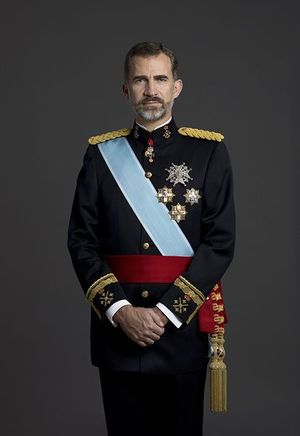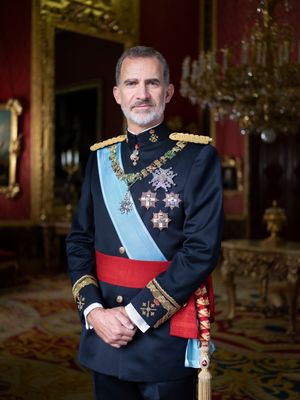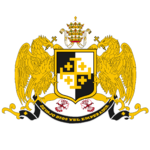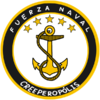Difference between revisions of "Alexander II of Creeperopolis"
m (Text replacement - "Human Rights in Creeperopolis" to "Human rights in Creeperopolis") |
m (Text replacement - "Capital Punishment in Creeperopolis" to "Capital punishment in Creeperopolis") |
||
| Line 414: | Line 414: | ||
Alexander II has been strictly raised as a [[Creeperian Catholic Church|Creeperian Catholic]] since he was very young. Likewise, he has raised all his children the same. He attends mass at the [[Basilica of Christ the King]] every Sunday and meets [[Pope of Creeperopolis|Pope]] [[Francisco I of Creeperopolis|Francisco I]] at mass every Sunday. | Alexander II has been strictly raised as a [[Creeperian Catholic Church|Creeperian Catholic]] since he was very young. Likewise, he has raised all his children the same. He attends mass at the [[Basilica of Christ the King]] every Sunday and meets [[Pope of Creeperopolis|Pope]] [[Francisco I of Creeperopolis|Francisco I]] at mass every Sunday. | ||
| − | Alexander II wants all his people to be good, practicing [[Creeperian Catholic Church|Catholics]], and greatly disapproves of non-Catholics, especially Atheists. [[Anti-Atheism in Creeperopolis]] is rampant, thanks in part to the [[Creeperian Civil War]] and Alexander II’s anti-Atheist rhetoric. Atheism was banned by Alexander II in 2007 as high blasphemy and made Atheism [[Capital | + | Alexander II wants all his people to be good, practicing [[Creeperian Catholic Church|Catholics]], and greatly disapproves of non-Catholics, especially Atheists. [[Anti-Atheism in Creeperopolis]] is rampant, thanks in part to the [[Creeperian Civil War]] and Alexander II’s anti-Atheist rhetoric. Atheism was banned by Alexander II in 2007 as high blasphemy and made Atheism [[Capital punishment in Creeperopolis#Capital Crimes|punishable by death]] when he made reformations to the [[Condor Initiative]] by instituting harsher punishments. He is more lenient to Agnostics and Irreligious to keep amiable relations with [[Quebecshire]]. |
Alexander II views [[Judaism]] and [[Protestantism]] and “lesser and inferior religions”, but considers [[Xussman Orthodox|Xussman Orthodoxy]] and [[Sacramatian Catholic Church|Sacramentian Catholicism]] as the third and second best sects of [[Christianity]], after [[Creeeperian Catholic Church|Creeperian Catholicism]], respectively. | Alexander II views [[Judaism]] and [[Protestantism]] and “lesser and inferior religions”, but considers [[Xussman Orthodox|Xussman Orthodoxy]] and [[Sacramatian Catholic Church|Sacramentian Catholicism]] as the third and second best sects of [[Christianity]], after [[Creeeperian Catholic Church|Creeperian Catholicism]], respectively. | ||
| − | In May 2020, Alexander II outlawed [[Islam]] and made [[Anti-Islamism in Creeperopolis|practicing Islam]] [[Capital | + | In May 2020, Alexander II outlawed [[Islam]] and made [[Anti-Islamism in Creeperopolis|practicing Islam]] [[Capital punishment in Creeperopolis#Capital Crimes|punishable by death]]. The decree was added to the [[Condor Initiative]]. The move was made in order to reduce the practicing of [[Deltinian Islam]] in the [[Departments of Creeperopolis|department]] of [[Deltino (department)|Deltino]]. |
==== Views on Homosexuality ==== | ==== Views on Homosexuality ==== | ||
Revision as of 16:28, 28 January 2021
Alexander II of Creeperopolis (b. September 15, 1983, full name Alexander II Romero Adolfo Martínez Hernández) is the current reigning Emperor of Creeperopolis and the Creeperans. He rose to power and the imerpail throne of Creeperopolis on June 18, 2003, following the 2003 Creeperian coup d'état which was staged by the by Creeperian Armed Forces and the National Intelligence Directorate.
The second child of Alfonso VI, Alexander II was raised by his father and uncles, Adolfo V and Romero III, but he was always in the shadow of Alfonso Martínez Hernández, his older brother, Grand Prince of Creeperopolis, and heir to the imperial throne of Creeperopolis. He entered the Creeperian military in 1991 and began learning Creeperian military tactics, preparing himself to fight the then long ongoing Third Senvarian Insurgency and the currently ongoing Mara War. He finished his studies in 1995 and entered the Creeperian Army immediately as a General two years after his older brother Alfonso but two years before his younger brother Salvador.
Alexander became the Grand Prince of Creeperopolis upon the death of his older brother, Alfonso Martínez Hernández, on April 29, 2002. His father had ushered in a totalitarian Creeperian regime, known as the Alfonsisto upon his rise to power and instituted martial law on October 16, 1999. The Creeperian secret police, the National Intelligence Directorate (DINA), was ramped up in numbers and the armed forces felt ignored and began plotting a coup, especially after Alfonso VI signed a historic cease fire with Mara Salvatrucha during the Mara War in 2000. The Minister of Defense, Augusto Cabañeras Gutiérrez, approached Alexander and offered him the throne if he joined the coup plot against his father. After supposedly being bribed 30 million colóns, the Army, Navy, and the Air Force staged a coup on June 18, 2003, which killed Alfonso VI and allowed Alexander II to ascend to the imperial throne. Alexander II ended martial law and reinstated the Constitution. Supporters of Alfonso VI accused Alexander II and the armed forces of usurping the throne. As a consequence, thousands of supporters of Alfonso VI dissapeared from 2003-2004.
Alexander II’s reign has been marked by rampant government and military corruption, high crime and murder rates, and an increase of military activity in the Mara War, Deltinian Insurgency, and San Pedroan Bush War. Despite this, Alexander II is considered a very popular Emperor allowing patriotism and nationalism to be at the highest they have ever been since the conclusion of the Creeperian Civil War in 1949. He has also brought an end to the long ongoing Third Senvarian Insurgency and Castillianan Insurgency in 2020. Alexander II is accused of inciting and continuing ethnic violence in Creeperopolis.
Contents
Early Life
| ||
|---|---|---|
|
Emperor of Creeperopolis Reigning since 2003
Politics: Family: |
||
Alexander Romero Adolfo Martínez Hernández was born to Prince Alfonso Romero Martínez Escobar and Princess Angelina María Hernández Fuentes de Martínez on September 15, 1983, in the San Salvador Imperial Palace, San Salvador, San Salvador, Creeperopolis. He was the second son of Prince Alfonso Martínez Escobar. His older brother was Alfonso Romero Adolfo Martínez Hernández (1981-2002) and his younger brother was Salvador Romero Alfonso Martínez Hernández (1985-2004). He grew up and was raised in the San Salvador Imperial Palace throughout his childhood. He was always shadowed by his older brother Alfonso since he was his father's favorite and the heir to the Creeperian throne.
On April 29, 2002, Alfonso Martínez Hernández was shot in Adolfosburg when he was on his way to oversee the construction of a religious monument in the city. The bullet came from a sniper believed to be hiding in a nearby skyscraper. The country immediately went on high alert and the Army was stationed in the streets of Salvador, Adolfosburg, and San Salvador to thwart any other possible assassination attempts.
The National Intelligence Directorate was immediately ordered to investigate the assassination but the DINA found little to no evidence as to who the assassin was, where the assassin was, and why the Grand Prince was assassinated. Alfonso VI was infuriated at the poor investigation conducted by the DINA and he began to suspect that the DINA itself assassinated the Grand Prince. On October 19, 2002, Emmanuel Cabañeras Videla, the then Chief of the DINA, was assassinated in his home. It is heavily believed that Alfonso VI ordered the assassination. Cabañeras Videla was succeeded by his son, Augusto Cabañeras Gutiérrez, as Minister of Defense of Creeperopolis, Chief of the National Intelligence Directorate, and Chief Field Marshal of Creeperopolis.
The death of his older brother made Alexander Martínez Hernández the heir of Alfonso VI and the Grand Prince of Creeperopolis. Minister of Defense Augusto Cabañeras Gutiérrez, along with Chief Admiral José Guerrero López and Chief General Felipe Cambeiro Cavallería, began to formulate a plan to depose Alfonso VI and his totalitarian regime, commonly known as the "October 16 Regime" or the "Alfonsisto."
The three men conspiring the coup had no idea how the Creeperian people would react to the overthrow of their government. The three believed the regime to be unpopular, but there was no real way to find out at the time. They, however, knew how to gain the support of the people. The three approached Alexander Martínez Hernández, the eldest surviving son of Alfonso VI, and asked him if he wished to join in on the plot to depose his father. After a large bribe of 30 million colóns and promises of power, Alexander Martínez Hernández joined aboard the plot to overthrow Alfonso VI.[citation needed]
Reign
Coup and Accession
The coup to topple the totalitarian regime of Alfonso VI began on the command of Augusto Cabañeras Gutiérrez at 9:11am, San Salvador Time (SST), on June 18, 2003. The coup started with the I and II Creeperian Army Corps moving into positions to surround the city of San Salvador to prevent Alfonso VI escaping via land, followed by the III and the IX Creeperian Army Corps setting up offensive positions in the city near the San Salvador Imperial Palace. The VII Creeperian Army Corps was stationed at the Alfonso I Martínez International Aiport. The División Negra, the elite of the Creeperian Army, was ordered to surround the Imperial Palace and to prepare for a storming of the Palace.
The III Creeperian Army Corps was ordered to begin the artillery shelling of the Imperial Palace at 9:58am. At 10:00am, the Army siezed a radio station in San Salvador and sent a broadcast to the nation saying:
"Do not fear faithful Creeperans. This is not a malicious nor foreign nor [Senvarian] takeover of the Fatherland or toppling of the government. Instead, the Armed Forces of the [Creeperian] Fatherland and the [Creeperian Catholic] Church have witnessed the totalitarianism of the regime of Alfonso VI. Under the guide of the Lord God, we are removing this wicked government from power and are installing a truthful, honest, and benevolent government, a new Emperor on the Imperial throne from the line of Martínez. Long live Creeperopolis! Long live the Fatherland! Long live God!"
The Army was then ordered to storm the Palace and to offer no quarter to the Imperial Guards who have "betrayed the Fatherland" (after the Air Force and artillery completed bombing the Palace). The guards were ruthlessly massacred by the Army, with an estimated 300 guards being slaughtered.
The day before the coup, Guerrero López quietly, without the knowledge of Alfonso VI, moved 50 warships to Lake San Salvador to prevent any possibility for the Emperor to flee via the lake.
The Air Force, under orders of Cambeiro Cavallería, captured the four major airports of San Salvador to prevent Alfonso VI from escaping via the air.
Then, the Air Force began bombing the Imperial Palace to damage any possible defenses and to kill as many guards as possible before it is stormed by the Army.
The day before the coup, Alexander Martínez Hernández left the Imperial Palace to Zapatista under the guise of inspecting Army positions in the area in preparation for an operation against Mara Salvatrucha in the Mara War. After leaving San Salvador, Martínez Hernández met up with Cabañeras Gutiérrez to prepare for the coup.
Throughout the coup, Martínez Hernández did little and was merely and observer in his rise to power.
The Imperial Guard was caught completely off guard by the coup. Of the total 70,000 Imperial Guards enlisted at the time, only 300 were at the Imperial Palace and ready to defend the Emperor.
Chief Guard Armando Figueroa Molina remained loyal to Alfonso VI and swore to defend the Emperor until the end. When the assault began with the bombings and shelling, several guards were killed and wounded. When the División Negra initiated the storming, all the guards were massacred, including Figueroa Molina. The remaining guards were forced to surrender and pledge allegiance to Alexander II following the coup.
Alfonso VI was taken completely by surprise by the coup. He knew that he had not kept the loyalty of the armed forces and that he will either be killed or imprisoned. When the shelling and bombing began, he moved to the bunker below the Imperial Palace. As the soldiers were storming the Palace, he committed suicide to prevent capture.
Domestic Affairs
The Miracle of Creeperopolis
During the reign of Alfonso VI, the Creeperian economy declined from 19.2 trillion colóns (2.4 trillion credits) in 1999 to 7.8 trillion colóns (980 billion credits) by the time of the coup in 2003. The crippling conditions occured due in part due to a lack of economic support from Quebecshire and the totalitarian policies of nationalizing several private organizations in Creeperopolis from 1999 to 2003.
Following the coup, then Minister of the Treasury César Casaus Morillo was arrested and forcibly dissapeared and replaced by Adán Dávalos Santángel.[citation needed] Under Dávalos Santángel, many nationalized companies were privatized and heavy tax breaks were granted to the National Coffee and Sugar Corporation (CORNACA), the National Mining and Smelting Corporation (CORNAMIF), the United Creeperian Banana Company (EMUPLAC), and the Creeperian Petroleum Corporation (PETRÓCRE), large Creeperian monopolies which were and still are vital to the Creeperian economy. These tax breaks and other economic reforms were instituted by the Salvador Boys, economists who studied at the University of Salvador. The economic reforms implemented by the Salvador Boys had three main objectives: economic liberalization, privatization of state-owned companies, and stabilization of inflation.
From 2003 to 2019, the Creeperian economy skyrocketed from a gross domestic product of 7.8 trillion colóns (980 billion credits) to 94.4 trillion colóns (11.8 trillion credits), making Creeperopolis the second largest GDP on Terraconserva. The rapid growth and success of the Creeperian economy has been coined the "Miracle of Creeperopolis" by Dávalos Santángel.
The Senvarian, Castillianan, Deltinian, and Mara Wars
When Alexander II became Emperor in 2003, he inherited command over three internal wars Creeperopolis was facing at the time: the Third Senvarian Insurgency raging since October 5, 1934, against the Senvarian Liberation Front and the Republic of Senvar, the Castillianan Insurgency raging since October 10, 1980, against the Militarist Front for National Liberation and the Castillianan National Council of Reorganization, and the Mara War raging since October 15, 1979, against Mara Salvatrucha. The wars are collectively known as the Creeperian Conflicts and it was now up to Alexander II to continue the fight against the opposition forces, with the Senvarians wanting independence as the Republic of Senvar, the Castillianans wanting independence as the Castillianan National Council of Reorganization, and the Maras wanting a Creeperian government which would turn a blind eye to the Mara's illegal activities such as the regime of Alfonso VI.
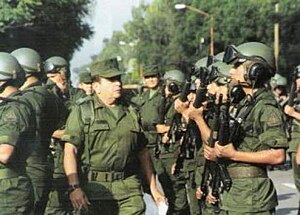
On January 1, 2000, Alfonso VI signed a historic cease fire with Mara Salvatrucha where the Creeperian government promised to no longer arrest members of the gang nor execute any gang members in exchange for a cessation in the criminal activities of the gang. The cease fire was extremely unpopular with the citizens since Mara Salvatrucha continued to commit crimes. Many called for a coup but those who did were arrested and forcibly disappeared.
After the 2003 coup and beginning in 2004, the Creeperian Armed Forces under orders of Alexander II resumed operation aimed against Mara Salvatrucha. The infamous Motion for the Eradication of Mara Salvatrucha resoundingly passed in the Council of Mayors by a unanimous vote and was signed and put into law by Alexander II on June 1, 2004. The motion put into effect a six month period where the Creeperian Armed Forces, the National Intelligence Directorate, the Creeperian National Police, the Salvadoran National Police, and the National Police of the Papal State are directed to immediately execute anyone who is a member of Mara Salvatrucha or even is a suspected member of Mara Salvatrucha on the spot of the arrest. The motion also called for the immediate execution of all members of Mara Salvatrucha currently incarcerated. The motion lead to the executions of 2,066 members of Mara Salvatrucha from June 1, 2004 through January 1, 2005. During the six month period, members of Mara Salvatrucha increased terrorist attacks on civilian and military targets making the war one of the deadliest in the world up to that point and the then second deadliest ongoing war, second only to the then ongoing Third Senvarian Insurgency. The motion was not renewed in January 2005 by the Council of Mayors.
On December 27, 2019, the Deltinian Insurgency began with the Deltinian Liberation Army defeating both the Creeperian Army and the Senvarian Liberation Front at the Battle of Rushdi. The rise of the Islamic Deltinians rose serious concern in Creeperopolis and the Castillianans, Creeperans, and Senvarians agreed to peace agreements in the Treaty of Adolfosburg and the Treaty of Puerto Atlántida ending the Castillianan Insurgency and the Third Senvarian Insurgency. Later in 2020, the Anti-Deltinian Armed Forces of Liberation - War of Elimination (FALANGE) formed as a coalition between ten Creeperian death squads.
Foriegn Affairs
As of May 2020, Alexander II has maintained, improved, and/or established diplomatic relations between Creeperopolis and many nations of the world.
| Nation | Creeperopolis' Stance | Notes | |
|---|---|---|---|
| Eminople | Great | Alexander II met with President of Eminople, Ethan DiMartino, on April 3, 2020. Not much is known about the meeting but it is known that the two agreed to redevelop the departments of Castilliano, Senvar, and Sonsatepan. Eminople would send 6,500 engineers to help in the redevelopment process.[1][2] The engineers began arriving in San Salvador on May 11, 2020.[3] | |
| Gagium | Neutral | ||
| Groffenord | Neutral | ||
| Lyoa | Excellent | Alexander II has met with Lyoan Presidents Marcil Yantanda, Joseph Kyundu, and Kemoh Foday several times to discuss trade agreements and strategies for the Internal conflict in Lyoa and the Second Lyoan Civil War. Kemoh Foday and Alexander II met in February 2020 and established the Cooperation and Development Coalition (CODECO) between Creeperopolis and Lyoa.[4] Creeperopolis and Lyoa also have a mining contract with the National Mining and Smelting Corporation (CORNAMIF). See Creeperopolis-Lyoa relations. | |
| New Gandor | Needs Improvement | President of New Gandor, Jacob Morgan, criticized and denounced Creeperopolis for the shootdown of a Morovan Airlines Cargo plane on January 21, 2020.[5] Tension continued after three Gandorian cargo planes were shotdown over Lyoa by the Creeperian Air Force on March 14, 2020, as a part of Creeperopolis' involvement in the Second Lyoan Civil War.[6] | |
| Paleocacher | Neutral | ||
| Quebecshire | Excellent | See Creeperopolis-Quebecshire relations. | |
| Rakeo | Needs Improvement | Rakeo has a border dispute with Creeperopolis. | |
| San Carlos Islands | Neutral | ||
| Sequoyah | Strained | Sequoyah legalized slavery in April 2020 and due to that, Sequoyah was ejected by Creeperopolis from the Cooperation and Development Coalition on May 2, 2020.[7][8][9] The expulsion was approved by Alexander II. | |
| Terranihil | Non-Existant | See Creeperopolis-Terranihil relations. | |
| Willdavie | Good | Willdavie and Creeperopolis have trade agreements over merchandise for the movie Diamante Áspero and for the National Coffee and Sugar Corporation (CORNACA). | |
| Xusma | Good | Xusma and Creeperopolis are both monarchies. | |
Personal Life
Family
| Creeperian royal family |
|---|
 |
|
Extended royal family |
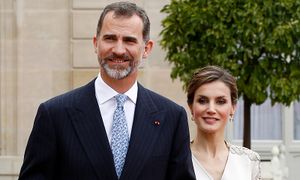
Alexander II is the head member of the House of Martínez, the ruling royal house and dynasty of Creeperopolis. He inherited the throne from his father, Alfonso VI. His older brother, Alfonso Romero Salvador Martínez Hernández, was assassinated in 2002 allowing him to become the heir to the throne. His younger brother, Salvador Romero Alfonso Martínez Hernández, was killed in 2004 in suspicious circumstances, and many believe the National Intelligence Directorate had him kill as a part of the 2003-2004 purges.[citation needed]
Issue
Alexander II is married to Alexandra María Santos Tzul de Martínez (m. January 19, 2005) and has two children:
- Grand Prince: Alexander Romero Alfonso Martínez Santos, b. February 6, 2006
- Princess: María Isabel Martínez Santos, b. October 17, 2009
Politics
 |
|---|
| This article is part of a series on the politics and government of Creeperopolis |
|
Outline |
Creeperian Initiative
When Alexander was 12 years old, he was enrolled into the Young Creeperans by his father and uncles to introduce him to the world of Creeperian politics and to prepare him to become a full member of the Creeperian Initiative. Alexander became a full member of the Creeperian Initiative on September 15, 1991.
During the military coup of 2003, leadership in the Creeperian Initiative, which was loyal to Alfonso VI, opposed the actions of the Creeperian Armed Forces and condemned the actions of Alexander, expelling him from the Creeperian Initiative. However, when the coup succeeded and he ascended to the throne, Alexander II ordered the immediate arrest of all Creeperian Initiative leaders. The Secretary of the Creeperian Initiative and Chief Mayor of the Council of Mayors, Rubén Franco Alcabú, was arrested and executed by a firing squad on June 18 for high treason against Alexander II. The execution of Rubén Franco Alcabú began the 2003-2004 Creeperian Purges where tens of thousands of leaders and members of the Creeperian Initiaitve, Creeperian Armed Forces, and Council of Mayors were arrested and tortured with thousands being executed.
Antonio Sáenz Flores, the Secretary of the Creeperian Initiative under Romero III, was reinstated. He died in 2004 and was replaced by his son, José Sáenz Morales, continuing the dynasty of Antonio Sáenz Heredia. Martín Gutiérrez Sánchez, the Chief Mayor of the Council of Mayors under Romero III, was also reinstated. Armando Calderón Sol, the President of El Salvador, swore loyalty to Alexander II.
Following the failed 2020 Creeperian coup d'état attempt, the National Intelligence Directorate conducted a large scale operation and raided the homes of several Creeperian senators and mayors. In total, 34 senators and 183 mayors were arrested on charges of supporting the putsch or for having sympathies to the coup. An additional 3 senators and 15 mayors were arrested for allegedly aiding in the assassination of Chief Senator Martín Gutiérrez Sánchez.[10]
Following the raids, Alexander II officially abolished the Council of Senators, effectively abolishing the ceremonial legislative branch of the government. Creeperopolis returned to a completely absolute monarchy for the first time since December 31, 1887, when the Second Parliament was established.[11]
On February 15, 34 senators and 183 mayors were arrested on charges of supporting the February 2020 putsch or for having sympathies to the coup. An additional 3 senators and 15 mayors were arrested for allegedly aiding in the assassination of Chief Senator Martín Gutiérrez Sánchez during the coup.
Of those condemned to death, 3 senators and 8 mayors paid a bail of 800 million colóns each to be pardoned of their crimes while 13 more senators and 49 more mayors paid a bail of 300 million colóns to have a reduced sentence of only 10 year imprisonment in a good quality prison followed by 5 additional years of house arrest. The remaining 21 senators and 141 mayors were all hanged.[12]
Those sentenced were charged with high treason, murder, acts of terrorism against civilians, apostasy, blasphemy, murder of civilians, practicing communism, waging war on God, waging war on the Empire, acts of terrorism against soldiers, murder of soldiers, no-quarter, pillaging and looting, use of child soldiers in the Free Creeperian Army, and rape.
Military Service
Alexander II entered the Creeperian military in 1991 and began learning Creeperian military tactics, preparing himself to fight the then long ongoing Third Senvarian Insurgency and the currently ongoing Mara War. He finished his studies in 1995 and entered the Creeperian Army immediately as a General two years after his older brother Alfonso but two years before his younger brother Salvador.
The three men conspiring the coup had no idea how the Creeperian people would react to the overthrow of their government. The three believed the regime to be unpopular, but there was no real way to find out at the time. They, however, knew how to gain the support of the people. The three approached Alexander Martínez Hernández, the eldest surviving son of Alfonso VI, and asked him if he wished to join in on the plot to depose his father. After a large bribe of 30 million colóns and promises of power, Alexander Martínez Hernández joined aboard the plot to overthrow Alfonso VI.[citation needed]
The coup to topple the totalitarian regime of Alfonso VI began on the command of Augusto Cabañeras Gutiérrez at 9:11am, San Salvador Time (SST), on June 18, 2003. The coup started with the I and II Creeperian Army Corps moving into positions to surround the city of San Salvador to prevent Alfonso VI escaping via land, followed by the III and the XI Creeperian Army Corps setting up offensive positions in the city near the San Salvador Imperial Palace. The XII Creeperian Army Corps was stationed at the Alfonso I Martínez International Aiport. The División Negra, the elite of the Creeperian Army, was ordered to surround the Imperial Palace and to prepare for a storming of the Palace.
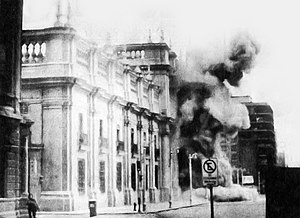
The day before the coup, Alexander Martínez Hernández left the Imperial Palace to Zapatista under the guise of inspecting Army positions in the area in preparation for an operation against Mara Salvatrucha in the Mara War. After leaving San Salvador, Martínez Hernández met up with Cabañeras Gutiérrez to prepare for the coup.
Throughout the coup, Martínez Hernández did little and was merely and observer in his rise to power.
The Imperial Guard was caught completely off guard by the coup. Of the total 70,000 Imperial Guards enlisted at the time, only 300 were at the Imperial Palace and ready to defend the Emperor.
Chief Guard Armando Figueroa Molina remained loyal to Alfonso VI and swore to defend the Emperor until the end. When the assault began with the bombings and shelling, several guards were killed and wounded. When the División Negra initiated the storming, all the guards were massacred, including Figueroa Molina. The remaining guards were forced to surrender and pledge allegiance to Alexander II following the coup.
Alfonso VI was taken completely by surprise by the coup. He knew that he had not kept the loyalty of the armed forces and that he will either be killed or imprisoned. When the shelling and bombing began, he moved to the bunker below the Imperial Palace. As the soldiers were storming the Palace, he committed suicide to prevent capture.
When Alexander II became Emperor in 2003, he inherited command over three internal wars Creeperopolis was facing at the time: the Third Senvarian Insurgency raging since October 5, 1934, against the Senvarian Liberation Front and the Republic of Senvar, the Castillianan Insurgency raging since October 10, 1980, against the Militarist Front for National Liberation and the Castillianan National Council of Reorganization, and the Mara War raging since October 15, 1979, against Mara Salvatrucha. The wars are collectively known as the Creeperian Conflicts and it was now up to Alexander II to continue the fight against the opposition forces, with the Senvarians wanting independence as the Republic of Senvar, the Castillianans wanting independence as the Castillianan National Council of Reorganization, and the Maras wanting a Creeperian government which would turn a blind eye to the Mara's illegal activities such as the regime of Alfonso VI.
On January 1, 2000, Alfonso VI signed a historic cease fire with Mara Salvatrucha where the Creeperian government promised to no longer arrest members of the gang nor execute any gang members in exchange for a cessation in the criminal activities of the gang. The cease fire was extremely unpopular with the citizens since Mara Salvatrucha continued to commit crimes. Many called for a coup but those who did were arrested and forcibly disappeared.
After the 2003 coup and beginning in 2004, the Creeperian Armed Forces under orders of Alexander II resumed operation aimed against Mara Salvatrucha. The infamous Motion for the Eradication of Mara Salvatrucha resoundingly passed in the Council of Mayors by a unanimous vote and was signed and put into law by Alexander II on June 1, 2004. The motion put into effect a six month period where the Creeperian Armed Forces, the National Intelligence Directorate, the Creeperian National Police, the Salvadoran National Police, and the National Police of the Papal State are directed to immediately execute anyone who is a member of Mara Salvatrucha or even is a suspected member of Mara Salvatrucha on the spot of the arrest. The motion also called for the immediate execution of all members of Mara Salvatrucha currently incarcerated. The motion lead to the executions of 2,066 members of Mara Salvatrucha from June 1, 2004 through January 1, 2005. During the six month period, members of Mara Salvatrucha increased terrorist attacks on civilian and military targets making the war one of the deadliest in the world up to that point and the then second deadliest ongoing war, second only to the then ongoing Third Senvarian Insurgency. The motion was not renewed in January 2005 by the Council of Mayors.
On December 27, 2019, the Deltinian Insurgency began with the Deltinian Liberation Army defeating both the Creeperian Army and the Senvarian Liberation Front at the Battle of Rushdi. The rise of the Islamic Deltinians rose serious concern in Creeperopolis and the Castillianans, Creeperans, and Senvarians agreed to peace agreements in the Treaty of Adolfosburg and the Treaty of Puerto Atlántida ending the Castillianan Insurgency and the Third Senvarian Insurgency. Later in 2020, the Anti-Deltinian Armed Forces of Liberation - War of Elimination (FALANGE) formed as a coalition between ten Creeperian death squads.
Alleged War Crimes
Alexander II has been accused of supporting and funding terrorist organizations such as the Militarist Nationalist Front, the Anti-Deltinian Armed Forces of Liberation - War of Elimination, the Holy Resistance Movement, the Patriotic Forces for the Liberation of Lyoa, and the Atlántidan Defense Militia.Template:Citaiton needed Events such as the Zapatista Massacre and the Mapastepec Massacre were effectively wiped from the Creeperian education system.
Sources claim that the Tuxtla Martínez-Panachor Maximum Correctional Facility is being used as a concentration camp similar to how the Teguracoa Extermination Camp was used by the National Council for Peace and Order during the Creeperian Civil War as a part of the De-Catholization. The 9,803 prisoners of SPIC Martínez spend all of their day in their cells with food being brought to them. No prisoner has ever successfully escaped SPIC Martínez, although there have been numerous escape attempts. The facility is commonly cited as a major concern for the status of human rights in Creeperopolis and many have called it a concentration camp and extermination camp.[citation needed] The Creeperian government denies these accusations. No prisoner has ever successfully escaped and no prisoner has ever been released or transferred.
Corruption
Corporate Corruption
Tuxtla Martínez train disaster

On November 15, 2007, at 7:36 a.m. a 7-locomotive/122-car Unión Pacífico freight train (RFC 4398) that was transporting sugar for the National Coffee and Sugar Corporation lost control while descending Cajon Pass and derailed on an elevated curve, plowing into a residential area by the railroad tracks.
Twelve people were killed with fifteen more being injured. Fifteen houses on the street immediately next to the tracks were demolished by the wreck, as were the lead locomotives and all of the freight cars. Rail yard workers in Helam had miscalculated the weight of the train, while the engineer and crew at the head end were unaware that one of the rear helper engines had inoperative dynamic brakes. Hence there was not enough dynamic braking force available to maintain control of train speed during the descent. When the helper engineer realized that the train speed was not being adequately controlled, he made an emergency brake application, which deactivated dynamic braking, resulting in a runaway condition. The train reached a speed of about 110 mph before derailing on an elevated 35 mph curve sending the head end locomotives and several cars off the high railroad bed and into houses on the street below, completely demolishing them.
After an investigation by the Imperial Transportation Safety Administration (AIST), it was discovered that the National Coffee and Sugar Corporation (CORNACA) faced heavy Quebecshirite demand for Creeperian sugar for Pepsi and other sugar products. CORNACA turned to the Unión Pacífico (RFC), its primary coffee and sugar transporter, to speed up the delivery of sugar and to make its deliveries larger in size. The railroad was pressured and bribed into taking less time to inspect their trains and conduct safety tests, and to make their trains run faster, run more often, and pull heavier and larger loads by CORNACA.
On the day of the derailment, two separate deliveries were merged into one on demand of CORNACA. Consequently, the weight of the larger train was not calculated and not enough locomotives were assigned to RFC 4398 to descend down Cajon Pass. Of the seven locomotives, four of them had faulty or non-operational brakes due to less frequent maintenance. The faults were never detected as no safety or brake tests have been preformed in two years due to CORNACA's pressure and bribes. When the train began to roll down the grade and the brakes were applied, the fact that the brakes were faulty was discovered.
After the disaster, all five lead locomotives and all freight cars were deemed total losses and scrapped on site. The two end locomotives were repaired and reentered service in late 2008. Of the 15 destroyed houses, 6 were rebuilt. In place of the other 9 is a memorial dedicated to those who died. The CEO's of CORNACA and RFC were both put on trial for several charges but they were both acquitted.
BioWorkes
Following the announcement of Bio Workes, a Quebecshirite company, plans to open a new manufacturing complex in Tuxtla Martínez, Creeperopolis, on September 7, 2019[13] and the Creeperian government's ready acceptance (although with several conditions)[14], there are rumors that bribes, kickbacks, and political and economic favors allowed an agreement to be reached.[citation needed]
Other
Following a state visit by the Grandmaster of Quebecshire, rumors have begun circulating that André Bellerose suggested to Alexander II to hand out several bribes and political favors to Senvarian politicians to help pacify and stabilize the region.[citation needed] These rumors were denied by Alexander II and André Bellerose.
Allegations have appeared against Alexander II accusing him of ordering the National Intelligence Directorate to assassinate several Council Mayors in order to end wars and protests such as Ramón Nores Murillo, Israel Encarnación Aguayo, and Adán Tamayo Navarro.[15][16][17]
Foreign Media outlets have called out the rampant Creeperian corruption such as Greater Sacramento's Alyibuhu Live during a press conference between Grandmaster of Quebecshire André Bellerose and Emperor of Creeperopolis Alexander II on September 6, 2019. The network was subsequently barred from entering or broadcasting in Creeperopolis for the foreseeable future the following day.[18]
The establishment of the Alliance of Nationalist Recapitalization (ARENA) on July 6, 2020, faced absolutely no criticism or protest from Alexander II when the monopoly of four Creeperian monopolies, Creeperian Airlines (AC), Creeperian Petroleum Corporation (PETRÓCRE), National Coffee and Sugar Corporation (CORNACA), United Creeperian Banana Company (EMUPLAC), was created by Salvador Correa Reyes, Sebastián Fernán Cicerón, Julián Leguizamo Cabal, Pedro Vicenté Saelices. The super monopoly hold a massive grip on Creeperopolis' commercial economic output and have invited other monopolies to join which would increase ARENA's grip on the economy. ARENA has been called an embezzlement scheme and Alexander II has been accused of being in on the scheme.[citation needed]
Some businesses have suggested that facilitation payments are demanded from the authorities when conducting commercial activities in Creeperopolis and the government often shows favoritism towards certain well-connected companies.[citation needed]
Military Corruption
Operation Pineapple
Operation Pineapple was a raid conducted by the National Intelligence Directorate on May 15, 2020, which arrested then Chief Guard of the Creeperian Imperial Guard, Ramón Illescas Galán.[19] He was replaced by César Mendoza Durán as Chief Guard. He was crucified on May 28, 2020 on charges of high treason, murder, acts of terrorism against civilians, apostasy, blasphemy, murder of civilians, practicing communism, waging war on God, waging war on the Empire, acts of terrorism against soldiers, murder of soldiers, no-quarter, pillaging and looting, use of child soldiers in the Free Creeperian Army, and rape during the 2020 Creeperian coup d'état attempt.
Operation Banana
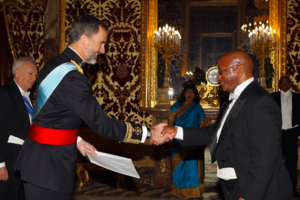
Operation Banana was the joint Creeperian-Lyoan operation conducted on June 17, 2020, which arrested Antonio Gisbert Alcabú, the President of the Creeperian Government-in-Exile and the leader of the Free Creeperian Army.
At 12:15am LNT (3:15am SST), the National Intelligence Directorate (DINA), the División Negra, and the Special Security Service (SSS) initiated Operation Banana (Operación Banana) to either capture or assassinate Antonio Gisbert Alcabú, the President of the Provisional Government of the Republic of Creeperopolis in Exile. Three Maroto Botín MB-33 helicopters, each carrying 7 DINA agents, 7 FAC soldiers, and 2 SSS agents took off from Nyabari Military Airport and flew southeast to Syrina, the capital-in-exile of the Creeperian Government-in-Exile. Each helicopter was armed with a mounted Figueroa-33 Tipo-2013 “Matador” and each agent and soldier had a Figueroa-24 Tipo-2017 with a night vision scope. Everyone had a secondary Figueroa-3 Tipo-2016 pistol. One soldier was armed with a Figueroa-203 Tipo-2014 submachine gun, another with a Figueroa-17 Tipo-2007 sniper rifle with a night vision scope, and another with a Figueroa-818 Tipo-1979 shotgun. Each DINA and SSS agent had a machete. All the pistols and automatic rifles were silenced.
The journey took 36 minutes from Nyabari to Syrina. The helicopter landed one mile away from Syrina in a clearing north of the city. The 48 men march silently through the jungle towards Syrina. The fifteen minute march went uneventful. The soldiers reached the outskirts of the city and slowly made their way under the cover of night to the hotel which was serving as the provisional headquarters of the GPRCE. After five minutes, the soldiers were 20 yards from the building. After entering the hotel and arresting Gisbert Alcabú, an LRCC patrol noticed the group escaping, and opened fire. The FAC, DINA, and SSS men returned fire, eliminating the two LRCC fighters. This alerted more patrols, who began to converge on the area. Another small firefight ensued as the united forces reached the edge of the jungle. Four LRCC men fired, and the agents fired back. One SSS agent was hit in the leg with a bullet, while the LRCC fighters were shot dead. The united FAC, DINA, and SSS forces then disappeared into the bush, marching back to the LZ where the helicopters awaited their arrival. The return trip took another 15 minutes, with the forces quickly loading up. The soldiers then began treating each other’s wounds.[20]
The Creeperian-Lyoan operatives only suffered 6 injuries while 13 Free Creeperian Army soldiers and 7 Lyoan Revolutionary Command Council soldiers were killed.
Antonio Gisbert Alcabú was executed by the Creeperian government via a firing squad of tanks on June 18, 2003, during a military parade to commemorate the 2003 Creeperian coup d'état.[21] The long list of 110 charges was brought into question by some sources and some accuse Leonardo Magrina Magrina of fabricating many of the charges and Alexander II of keeping the charges in place.[citation needed]
Other
Sources claim that rampant bribery in the Creeperian military has allowed the rampant insurgent, gang, and death squad violence in southern Creeperopolis to get out of control. Parts of the south are effectively controlled and governed by insurgents, gangs, and death squads.[citation needed] There are also allegations that the death squad FRENAMI is operated by the government,[citation needed] claims the government vehemently deny.
The Gandorian Government took into account what the Creeperian Government said about world peace following the shootdown of Gandorian International Cargo Flight 238 on March 14, 2020, and after hours of deliberation decided to make a deal with the Creeperian Government. The Creeperian Government paid reparations for the civilians killed totaling to 1,747,200 Creeperian Colóns, or 218,400 New Gandorian Caps to the families of those lost, the equivalent of 250,000 Quebecshirite Credits. In return the New Gandorian Government officially left the Second Lyoan Civil War. Creeperopolis agreed to pay the 1,747,200 Creeperian Colóns in exchange for a Gandorian departure from Lyoa.[22][23] Many believe there was an additional secret bribe.[citation needed]
Political Corruption
2003-2004 Creeperian Purges
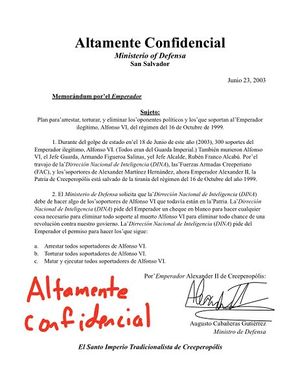
During the military coup of 2003, leadership in the Creeperian Initiative, which was loyal to Alfonso VI, opposed the actions of the Creeperian Armed Forces and condemned the actions of Alexander, expelling him from the Creeperian Initiative. However, when the coup succeeded and he ascended to the throne, Alexander II ordered the immediate arrest of all Creeperian Initiative leaders. The Secretary of the Creeperian Initiative and Chief Mayor of the Council of Mayors, Rubén Franco Alcabú, was arrested and executed by a firing squad on June 18 for high treason against Alexander II. The execution of Rubén Franco Alcabú began the 2003-2004 Creeperian Purges where tens of thousands of leaders and members of the Creeperian Initiative, Creeperian Armed Forces, and Council of Mayors were arrested and tortured with thousands being executed.
Antonio Sáenz Flores, the Secretary of the Creeperian Initiative under Romero III, was reinstated. He died in 2004 and was replaced by his son, José Sáenz Morales, continuing the dynasty of Antonio Sáenz Heredia. Martín Gutiérrez Sánchez, the Chief Mayor of the Council of Mayors under Romero III, was also reinstated. Armando Calderón Sol, the President of El Salvador, swore loyalty to Alexander II.
2020 Creeperian Purges
Following the failed 2020 Creeperian coup d'état attempt, the National Intelligence Directorate conducted a large scale operation and raided the homes of several Creeperian senators and mayors. In total, 34 senators and 183 mayors were arrested on charges of supporting the putsch or for having sympathies to the coup. An additional 3 senators and 15 mayors were arrested for allegedly aiding in the assassination of Chief Senator Martín Gutiérrez Sánchez.[24]
Following the raids, Alexander II officially abolished the Council of Senators, effectively abolishing the ceremonial legislative branch of the government. Creeperopolis returned to a completely absolute monarchy for the first time since December 31, 1887, when the Second Parliament was established.[25]
On February 15, 34 senators and 183 mayors were arrested on charges of supporting the February 2020 putsch or for having sympathies to the coup. An additional 3 senators and 15 mayors were arrested for allegedly aiding in the assassination of Chief Senator Martín Gutiérrez Sánchez during the coup.
Of those condemned to death, 3 senators and 8 mayors paid a bail of 800 million colóns each to be pardoned of their crimes while 13 more senators and 49 more mayors paid a bail of 300 million colóns to have a reduced sentence of only 10 year imprisonment in a good quality prison followed by 5 additional years of house arrest. The remaining 21 senators and 141 mayors were all hanged.[26]
Those sentenced were charged with high treason, murder, acts of terrorism against civilians, apostasy, blasphemy, murder of civilians, practicing communism, waging war on God, waging war on the Empire, acts of terrorism against soldiers, murder of soldiers, no-quarter, pillaging and looting, use of child soldiers in the Free Creeperian Army, and rape.
Other
Sources have accused Creeperopolis of bribing Quebecshire to veto any resolutions in the Terraconserva Council of Nations which would harm Creeperopolis such as TCN Resolution 002 and TCN Resolution 004.[citation needed]
Religion
Views on Religion
Alexander II has been strictly raised as a Creeperian Catholic since he was very young. Likewise, he has raised all his children the same. He attends mass at the Basilica of Christ the King every Sunday and meets Pope Francisco I at mass every Sunday.
Alexander II wants all his people to be good, practicing Catholics, and greatly disapproves of non-Catholics, especially Atheists. Anti-Atheism in Creeperopolis is rampant, thanks in part to the Creeperian Civil War and Alexander II’s anti-Atheist rhetoric. Atheism was banned by Alexander II in 2007 as high blasphemy and made Atheism punishable by death when he made reformations to the Condor Initiative by instituting harsher punishments. He is more lenient to Agnostics and Irreligious to keep amiable relations with Quebecshire.
Alexander II views Judaism and Protestantism and “lesser and inferior religions”, but considers Xussman Orthodoxy and Sacramentian Catholicism as the third and second best sects of Christianity, after Creeperian Catholicism, respectively.
In May 2020, Alexander II outlawed Islam and made practicing Islam punishable by death. The decree was added to the Condor Initiative. The move was made in order to reduce the practicing of Deltinian Islam in the department of Deltino.
Views on Homosexuality
Alexander II is extremely anti-homosexuality and continued the practices of executing homosexuals. The exception for holders of Greater Sacramatian citizenship was revoked in 2010 and those who held Greater Sacramatian citizenship could be executed for homosexuality.
Relation with the Church
Alexander II holds the title of Holy Protector of the State of the Church and effectively protects the sovereignty of the State of the Church and the Creeperian Catholic Church. Alexander II uses the Church as a propaganda tool to keep popularity with the people of Creeperopolis.
Views on Preceding Monarchs
Alexander II views the reigns of Alfonso I the Great, Miguel I the Great, Carlos III the Martyred, Adolfo III the Great, and Saint Romero I the Great as the greatest in Creeperian history. He cites Alfonso I and Miguel I as great Crusaders, Carlos III and Adolfo III as protectors of the Church and the Monarchy, and St. Romero I as the greatest protector of the Church, Monarchy, and Creeperopolis, and the greatest Emperor in Creeperian history.
On the other hand, Alexander II views Manuel IV, Miguel VII, and Marcos I as Creeperopolis’ worst monarchs. The names Miguel and Marcos have both been greatly polarized in Creeperopolis due to the Creeperian Civil War.
Ancestry
| Ancestors of Alexander II of Creeperopolis | |||||||||||||||||||||||||||||||||||||||||||||||||||||||||||||||||||||||||||||||||||||||||||||||||||||||||||||||||||||||||||||||||||||||||||||||||||||||||||||||||||||||||||||||||||||||||||||||||||||||||||||||||||||||||||||||||||||||||||||||||||||||||||||||||||||||||||||||||||||||||
|---|---|---|---|---|---|---|---|---|---|---|---|---|---|---|---|---|---|---|---|---|---|---|---|---|---|---|---|---|---|---|---|---|---|---|---|---|---|---|---|---|---|---|---|---|---|---|---|---|---|---|---|---|---|---|---|---|---|---|---|---|---|---|---|---|---|---|---|---|---|---|---|---|---|---|---|---|---|---|---|---|---|---|---|---|---|---|---|---|---|---|---|---|---|---|---|---|---|---|---|---|---|---|---|---|---|---|---|---|---|---|---|---|---|---|---|---|---|---|---|---|---|---|---|---|---|---|---|---|---|---|---|---|---|---|---|---|---|---|---|---|---|---|---|---|---|---|---|---|---|---|---|---|---|---|---|---|---|---|---|---|---|---|---|---|---|---|---|---|---|---|---|---|---|---|---|---|---|---|---|---|---|---|---|---|---|---|---|---|---|---|---|---|---|---|---|---|---|---|---|---|---|---|---|---|---|---|---|---|---|---|---|---|---|---|---|---|---|---|---|---|---|---|---|---|---|---|---|---|---|---|---|---|---|---|---|---|---|---|---|---|---|---|---|---|---|---|---|---|---|---|---|---|---|---|---|---|---|---|---|---|---|---|---|---|---|---|---|---|---|---|---|---|---|---|---|---|---|---|---|---|---|
| |||||||||||||||||||||||||||||||||||||||||||||||||||||||||||||||||||||||||||||||||||||||||||||||||||||||||||||||||||||||||||||||||||||||||||||||||||||||||||||||||||||||||||||||||||||||||||||||||||||||||||||||||||||||||||||||||||||||||||||||||||||||||||||||||||||||||||||||||||||||||
Orders and Decorations
Styles and Titles
| Royal styles of Emperor Alexander II | |
|---|---|
 | |
| Reference style | His Imperial Majesty |
| Spoken style | Your Imperial Majesty |
| Alternative style | Sir |
Alexander II's full title as Emperor is:
"By the Grace of the Lord, our God, Alexander II, Emperor of Creeperopolis and the Creeperans, Emperor of all Catholics, Imperial Commander-in-Chief of the Imperial Army of Creeperopolis, Imperial Commander-in-Chief of the Imperial Naval Forces of Creeperopolis, Imperial Commander-in-Chief of the Imperial Air Force of Creeperopolis, Imperial Commander-in-Chief of the Imperial Guard of Creeperopolis, Holy Protector of the State of the Church, Emperor of El Salvador, King of Senvar, King of Sonsatepan, King of Atlántida, King of Castilliano, Archduke and Protector of Abdan, Archduke of Adolfosburg, Archduke of Atlántida del Sur, Archduke and Protector of Deltino, Archduke and Protector of Helam, Archduke of Isla Atlántida, Archduke and Protector of Jakiz, Archduke of La'Libertad del Norte, Archduke of La'Libertad del Sur, Archduke of La'Unión, Archduke of Nuevo Atlántida, Archduke of Salvador, Archuke of San Luís, Archduke of San Miguel, Archuke of San Pablo, Archduke of San Pedro, Archduke of San Romero, Archduke of San Salvador, Archduke of San Salvador del Norte, Archduke of Santa Ana, Archduke of Santa María, Archduke of Sonsonate, Archduke of Territorio Atlántidañero del Norte, Archduke of Territorio del Norte, Archduke of Zapatista, Duke of Ciudad Los'Ángeles, Duke of Puerto Francisco, Duke of San Salvador del Oeste, Duke of Suchitoto."
Arms
Creeperian Decorations
 Creeperopolis
Creeperopolis
 Grand Master and 29th Knight of the Imperial Order of the Papal and Creeperian Cross
Grand Master and 29th Knight of the Imperial Order of the Papal and Creeperian Cross Grand Master of the Imperial Cross of San Romero the Martyr
Grand Master of the Imperial Cross of San Romero the Martyr Grand Master of the Imperial Order of Miguel the Great
Grand Master of the Imperial Order of Miguel the Great Grand Master of the Imperial Cross of Alfonso the Great
Grand Master of the Imperial Cross of Alfonso the Great Grand Master of the Imperial Order of Adolfo the Great
Grand Master of the Imperial Order of Adolfo the Great Grand Master of the Imperial Order of Manuel the Great
Grand Master of the Imperial Order of Manuel the Great Grand Master of the Imperial Order of Felipe the Saint
Grand Master of the Imperial Order of Felipe the Saint Grand Master of the Imperial Order of the Cross of Fidel the Martyr
Grand Master of the Imperial Order of the Cross of Fidel the Martyr Grand Master of the Imperial Order of Valor and Bravery
Grand Master of the Imperial Order of Valor and Bravery Grand Master of the Imperial Order of the Cross of Carlos the Martyr
Grand Master of the Imperial Order of the Cross of Carlos the MartyrGrand Master of the Imperial Order of Romerism
 Grand Master of the Imperial Order of Grand Merit
Grand Master of the Imperial Order of Grand Merit Grand Master of the Imperial Order of Merit
Grand Master of the Imperial Order of Merit Grand Master of the Star of the Imperial Army (x4)
Grand Master of the Star of the Imperial Army (x4) Grand Master of the Star of the Imperial Navy
Grand Master of the Star of the Imperial Navy Grand Master of the Star of the Imperial Air Force
Grand Master of the Star of the Imperial Air Force Grand Master of the Star of the Imperial Guard
Grand Master of the Star of the Imperial Guard Grand Master of the Order of the Crusaders' Cross (x2)
Grand Master of the Order of the Crusaders' Cross (x2) Grand Master of the Order of José Delgado León (x2)
Grand Master of the Order of José Delgado León (x2) Grand Master of the Order of Santiago Matadeltinianos
Grand Master of the Order of Santiago Matadeltinianos Grand Master of the Order of the Star of the White Rose (x2)
Grand Master of the Order of the Star of the White Rose (x2)Grand Master of the Order of the Crusader's Cross (x2)
 Grand Master of the Order of Service to the Fatherland
Grand Master of the Order of Service to the Fatherland Grand Master of the Order of the Golden Star’s Cross (x3)
Grand Master of the Order of the Golden Star’s Cross (x3)Grand Master of the Cross of Adolfo I (x2)
 Grand Master of the Cross of Salvador III (x2)
Grand Master of the Cross of Salvador III (x2) Grand Master of the Order of the Hero
Grand Master of the Order of the Hero Grand Master of the Medal of Valor
Grand Master of the Medal of Valor Grand Master of the Order of the Creeperian Initiative
Grand Master of the Order of the Creeperian Initiative Grand Master of the Order of the Catholic Royalist Party
Grand Master of the Order of the Catholic Royalist Party Grand Master of the Order of the National Conservative Party
Grand Master of the Order of the National Conservative Party Grand Master of the Order of the Creeperian Pro-Fatherland Front
Grand Master of the Order of the Creeperian Pro-Fatherland Front Grand Master of the Mara Campaign Medal
Grand Master of the Mara Campaign Medal Grand Master of the Deltinian Campaign Medal
Grand Master of the Deltinian Campaign Medal Grand Master of the San Pedroan Campaign Medal
Grand Master of the San Pedroan Campaign Medal Grand Master of the Senvarian Campaign Medal
Grand Master of the Senvarian Campaign Medal Grand Master of the Castillianan Campaign Medal
Grand Master of the Castillianan Campaign Medal Grand Master of the Campaign Medal
Grand Master of the Campaign Medal
Foreign Decorations
 El Salvador
El Salvador
 Grand Master of the Order of Service to the Fatherland
Grand Master of the Order of Service to the Fatherland
 Koryo
Koryo
 2nd Class Member of the Order of Diplomatic Service Merit
2nd Class Member of the Order of Diplomatic Service Merit
 Lyoa
Lyoa
 1st Class Member of the Hero of the Republic
1st Class Member of the Hero of the Republic 1st Class Member of the Ally of the Revolution Medal
1st Class Member of the Ally of the Revolution Medal
 Paleocacher
Paleocacher
 1st Class Member of the Paleocacherian Navy Outstanding Conduct Ribbon
1st Class Member of the Paleocacherian Navy Outstanding Conduct Ribbon
 Quebecshire
Quebecshire
 Grand Officer of the Order of Quebecshire
Grand Officer of the Order of Quebecshire
 Reia
Reia
 Grand Cordon of the Order of the High Sun
Grand Cordon of the Order of the High Sun
 State of the Church
State of the Church
 Grand Cross of the Supreme Order of Christ
Grand Cross of the Supreme Order of Christ Grand Cross of the Order of the Papal Star
Grand Cross of the Order of the Papal Star Grand Cross of the Order of the Sacred Cross
Grand Cross of the Order of the Sacred Cross Grand Cross of the Order of Saint Romero I
Grand Cross of the Order of Saint Romero I Grand Cross of the Order of Saint Alfonso I
Grand Cross of the Order of Saint Alfonso I
 Xusma
Xusma
 Grand Cross of the Imperial Cross of Nosachyov
Grand Cross of the Imperial Cross of Nosachyov
See Also
References
- ↑ "Eminople Offers Engineers". April 3, 2020.
- ↑ "Creeperopolis Accepts Offer". April 3, 2020.
- ↑ "Eminopler Engineers Arrive in San Salvador". May 11, 2020.
- ↑ "Establishment of the Cooperation and Development Coalition". February 1, 2020.
- ↑ "Gandorian Response to the Shoot Down of MAC39". January 21, 2020.
- ↑ "MB-23's Strike Again". March 14, 2020.
- ↑ "CODECO Ultimatum to Sequoyah". April 30, 2020.
- ↑ "Sequoyah Ejected from CODECO". May 2, 2020.
- ↑ "Sequoyan Negotiations Rejected". May 9, 2020.
- ↑ "Gaceta Creeperiano - Large Scale DINA Raids and Arrests". February 15, 2020.
- ↑ "Gaceta Creeperiano - Council of Senators Abolished". February 15, 2020.
- ↑ "Gaceta Creeperiano - Mayors and Senators Sentenced to Death, Some Bailed". May 31, 2020.
- ↑ "Investment of Bio Workes, Bio Workes Announcement". September 7, 2019.
- ↑ "Investment of Bio Workes, Creeperian Announcement". September 7, 2019.
- ↑ "Gaceta Creeperiano - Assassination of Ramón Nores Murillo". December 21, 2019.
- ↑ "Gaceta Creeperiano - Suicide of Israel Encarnación Aguayo". January 15, 2020.
- ↑ "Gaceta Creeperiano - Assassination of Adán Tamayo Navarro". January 16, 2020.
- ↑ "Gaceta Creeperiano - Banning of Alyibuhu Live in Creeperopolis". September 7, 2019.
- ↑ "Operation Pineapple". May 15, 2020.
- ↑ "Creeperian Government - Operation Banana". June 17, 2020.
- ↑ "Gaceta Creeperiano - Execution of Antonio Gisbert Alcabú". June 18, 2020.
- ↑ "Backing Off". March 15, 2020.
- ↑ "Agreement Reached". March 15, 2020.
- ↑ "Gaceta Creeperiano - Large Scale DINA Raids and Arrests". February 15, 2020.
- ↑ "Gaceta Creeperiano - Council of Senators Abolished". February 15, 2020.
- ↑ "Gaceta Creeperiano - Mayors and Senators Sentenced to Death, Some Bailed". May 31, 2020.
